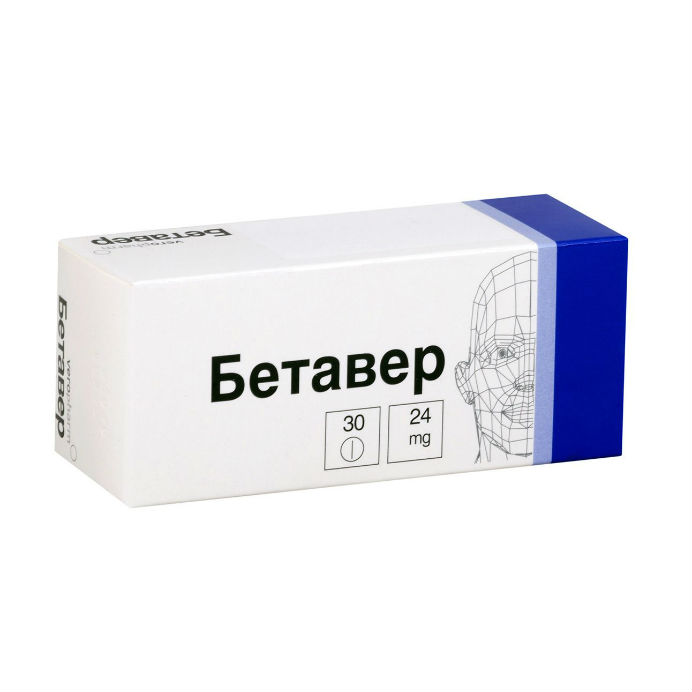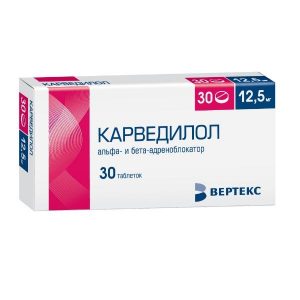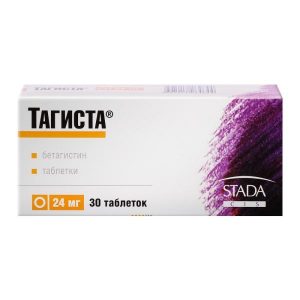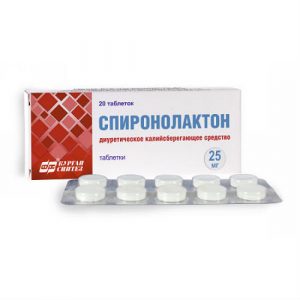Description
Release form
Tablets.
Packing
30 pcs
Pharmacological action
Betaver is a synthetic analogue of histamine.
Pharmacodynamics
Betagistin acts mainly on the histamine H1 and H3 receptors of the inner ear and vestibular nuclei of the central nervous system. By direct agonistic action on the H1 receptors of the vessels of the inner ear, as well as indirectly through the action on the H3 receptors, it improves microcirculation and the permeability of capillaries of the inner ear, normalizes the pressure of the endolymph in the labyrinth and cochlea. However, betahistine increases blood flow in the basilar artery.
It has a pronounced central effect, being an inhibitor of the H3 receptors of the vestibular nerve nuclei. Normalizes the conductivity in neurons of the vestibular nuclei at the level of the brain stem.
The clinical manifestation of these properties is a decrease in the frequency and intensity of dizziness, a decrease in tinnitus, and an improvement in hearing if it is reduced.
Pharmacokinetics
Absorbed rapidly, binding to plasma proteins is low. The time to reach Cmax is 3 hours. It is almost completely excreted by the kidneys in the form of a metabolite (2-pyridylacetic acid) within 24 hours. T1 / 2 – 3-4 hours.
Indications
Treatment and prevention of vestibular dizziness of various origins.
Syndromes characterized by dizziness, headache, tinnitus, progressive hearing loss, nausea and vomiting.
Disease and Meniere’s Syndrome.
Contraindications
Pregnancy.
Lactation (breastfeeding).
Hypersensitivity to the drug.
Caution: the drug should be prescribed to patients with peptic ulcer of the stomach or duodenum (including history), patients with pheochromocytoma and bronchial asthma.
Use during pregnancy and lactation
There is insufficient data to assess the effects of the drug during pregnancy and lactation, so its use during these periods is contraindicated.
Composition
1 tablet contains:
Active ingredient:
betahistine dihydrochloride – 24 mg.
Excipients:
microcrystalline cellulose,
lactose (milk sugar),
corn starch,
polyvinylpyrrolidone (povidone),
sodium carboxymethyl starch (primogel),
talcum, aerosilicyl dioxide
Dosage and Administration
The drug is administered orally with meals.
Dose / frequency of administration:
Betaver 8 mg – 1-2 tablets 3 times a day.
Betaver 16 mg – 1 / 2-1 tablet 3 times a day.
Improvement is noted already at the beginning of therapy. A stable therapeutic effect is achieved within 2 weeks of taking the drug and can increase when taking the drug for several months.
Duration of therapy is set individually.
Side effects
Possible: violation of the gastrointestinal tract.
In very rare cases: skin manifestations of allergic reactions (skin rash, itching, urticaria), Quincke’s edema.
Drug Interaction
The drug interaction of Betaver with other medicines has not been described.
Cases of incompatibility are unknown.
overdose
Symptoms: nausea, vomiting when taken at a dose of more than 640 mg, convulsions may occur.
Treatment: gastric lavage, activated carbon intake, symptomatic therapy.
Storage conditions
The drug should be stored in a dry, dark place, out of the reach of children, at a temperature not exceeding 25 ° C.
Expiration
2 years.
Deystvuyuschee substances
betahistine
Terms holidays from
Pharmacy Prescription
dosage form
Formulation
tablets




